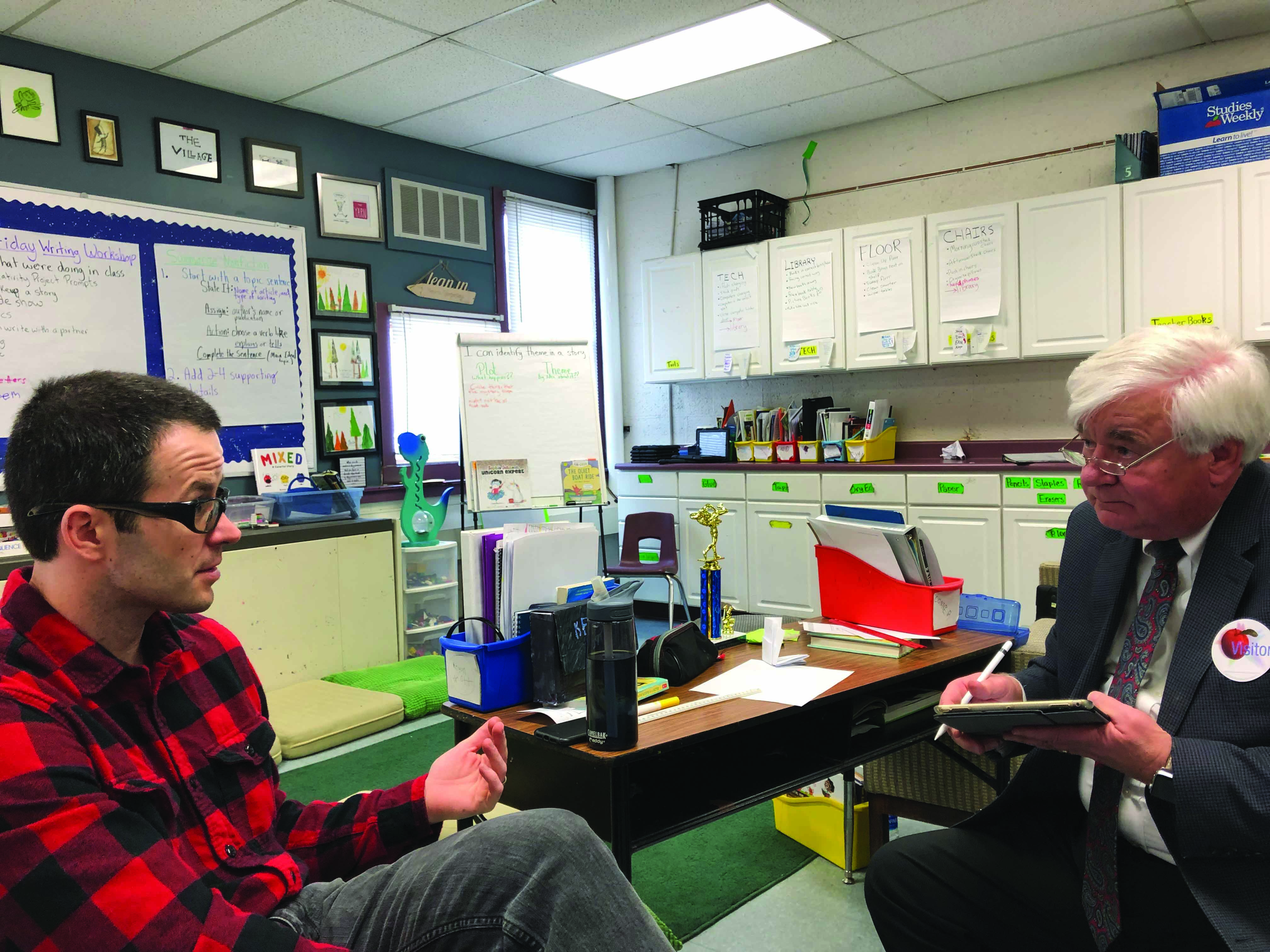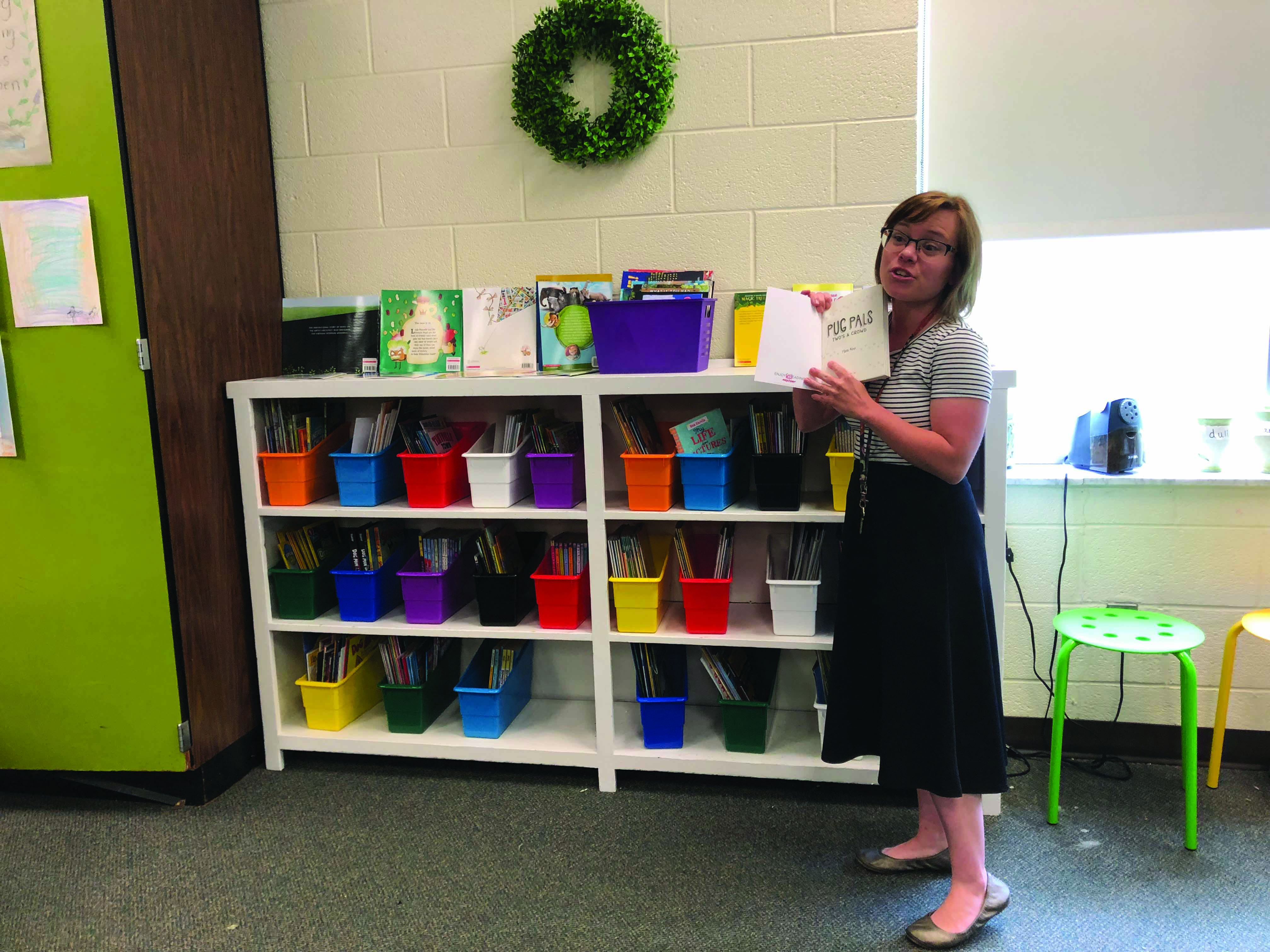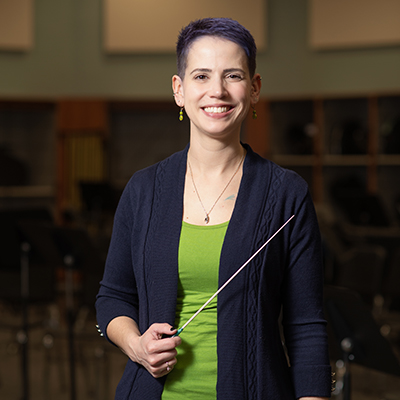Amid Benchmarks and Cut Scores, MEA Project Spreads Reading Love
It was nearing the last day of school in June, and second graders in MEA member Sally Howell’s Saginaw-area classroom patiently awaited a special unveiling.

With their classroom full of dignitaries and unfamiliar visitors, the youngsters listened patiently as various speakers talked excitedly of what was about to happen and why.
Bridgeport-Spaulding Superintendent Mark Whelton was one of the adults setting the hook in dramatic tones: “This is about reading and reading a lot and nobody putting rules on you. This is about reading because you love reading books that you want to read.”
When Whelton paused, one little boy filled the void. “Can we open the books now?”
A few minutes later, as the children screamed and cheered, Howell tore away a white sheet of butcher paper covering the front of a new bookshelf fitted with shiny plastic tubs full of hundreds of brand new books next to a new flexible seating area.
That moment represented the culmination of months of planning by MEA lobbyist Dr. David Michelson, who has adopted the idea of classroom libraries as a passion project he hopes to spread to additional disadvantaged school districts.
Under Michelson’s plan, Howell’s classroom was the first of six to receive 700 books valued at $1,700, along with a new bookshelf to house them, at no cost to the school or MEA. All costs are picked up by community sponsors and Scholastic in coordination with local legislators.
In Bridgeport, the library was funded by global auto parts supplier Nexteer with bipartisan help from area legislators, Sen. Ken Horn (R-Frankenmuth) and Rep. Vanessa Guerra (D-Saginaw). MEA UniServ Director Sue Rutherford assisted in all aspects of implementation.
“These kids are the future of our businesses and our communities, and any way that we can help better their education or their reading is very important to our company,” said Adam Root, Nexteer’s community relations coordinator.
For his part, Sen. Horn said he has been reading about different approaches to literacy, most recently an authoritative volume by renowned literacy expert and high school teacher Kelly Gallagher, Readicide: How Schools are Killing Reading and What You Can Do About It.

“If we can get kids beyond the superficial, where they dive deeply because they’re engaged, then we can facilitate real growth,” said the Republican chair of the Senate Economic and Small Business Development Committee.
The idea behind giving kids easy access to a wide range of books in the classroom is to encourage them to pick up a book by choice and discover the joy of reading. Students select books to enjoy, learn from, and share—but not to take tests or complete assignments.
“Back in the old days, when I was in school, we didn’t read to take a test on it; it was silent reading time,” Howell said as she watched her students happily sorting through selections from the shelves after the unveiling. “We’re bringing that back—reading for enjoyment.”
All of the MEA member teachers selected to participate in the pilot project also receive a book to help them understand how to operate a classroom library to spark students’ interest in reading—Game Changer! Book Access for All Kids, published last November by Scholastic.
Game Changer! is co-authored by MEA member Colby Sharp, a nationally recognized literacy expert and sought-after conference presenter who is a fifth-grade teacher in Jackson County, and Donalyn Miller, best-selling author of The Book Whisperer.
“I can have all the books in the world, but if I don’t know how to run a classroom library and how to do workshop and get kids reading, the books are just going to collect dust,” said Sharp, who consulted with Michelson on the pilot project.
Thanks to Michelson, Sharp’s book has also made its way to the desks of numerous state legislators in recent months.
Michelson’s project blossomed against the backdrop of the state’s third grade reading law and looming threat of retention for third graders who do not achieve a designated cut score on the M-STEP language arts test next spring.
“For so long, the state’s way of dealing with low-performing schools has been to penalize them,” Michelson said. “I thought instead why not bring in resources and call everybody’s attention to the power of classroom libraries and independent reading?”
More typically seen roaming the halls of the Capitol than working a crowd of seven-year-olds, Michelson developed his vision of piloting a literacy project in Michigan with encouragement from his daughter Robin Simmons, a seventh-grade teacher in South Dakota who uses Sharp’s strategies.
Along with other family and friends, Michelson had been donating to Robin’s classroom library for years when she gave him a copy of Sharp’s Game Changer! book and told him to read it. “I couldn’t put it down,” Michelson said. “I was so taken by the concept of literary deserts.”
As Sharp explains systemic scarcity, children from high-poverty areas are less likely to live in homes with 100 books or more or to attend schools with rich library collections. Research shows that kids surrounded by books are more likely to succeed at reading than those who are not.
“We have a poverty issue more than anything,” Sharp said. “If we continue to have these book deserts, it doesn’t matter what interventions we put in place, we’ll always be playing catch-up. Maybe we even get them to a third-grade level, but do we really get them to become a reader?”
Michelson’s dream with the pilot project would be to eventually get the state and community partners to fund classroom libraries in every K-3 classroom in the lowest-performing districts and training for teachers on how to run it.
“No politics involved, it’s just a great project to get the attention of legislators toward what reading should be, instead of laws focused on retention with only minimal support to go along with it.”
Meanwhile, he continues to lobby the Legislature to fix the third grade reading law based on feedback he received at several focus groups he conducted with MEA member elementary teachers in the past 18 months.
Educators say they want less testing draining time away from instruction, less time taken up by needless paperwork, smaller class sizes, and more classroom resources.
——————————————————————————————
Meet third-grade teacher Nicole Droscha from
Mason Public Schools. She will be writing a series of articles this
school year examining effects of Michigan’s third grade reading
law as a controversial retention mandate kicks in. Nicole hopes to
empower other educators to share their stories and be inspired to
work together to improve our educational system.


